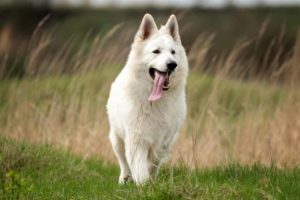The cheerful, yellow dandelion peeks its happy face above the surface of everyone’s lawns when spring makes its way towards summer. Pretty to behold, the dandelion is actually a weed, a weed that most homeowners want gone from their lawn. Dogs seem to be particularly drawn to this fragrant plant, enjoying both rolling in it as well as eating it. If your dog has decided dandelions are the ideal snack, do you need to be concerned? Can dogs eat dandelions, or are they toxic?
Do Dandelions Offer Any Health Benefits to Dogs and Humans?
The dandelion originated in Eurasia. However, since this weed’s seeds are easily spread through movement, it soon made its way to such areas as South America, India, New Zealand, and Australia. The dandelion grows well in any region of the world that enjoys a mild climate. The plant spreads through the wind carrying its fluff to new locales. This dandelion fluff is very hardy, taking root wherever it is blown and reproducing itself well.
It is only in recent years that the dandelion came to be known as a weed instead of a plant. Those involved in the preparation of herbal medicines recognized the health-giving properties of the humble dandelion, making use of them in various tinctures to assist with common ailments. One of its most popular usages is to assist with proper liver function in both humans and dogs. Among the qualities that the dandelion offers that are beneficial to both human and canine health are as follows:
- It is a natural digestive aid
- It has antibacterial properties
- It is an effective liver tonic
Are Dandelions Poisonous for Dogs?
Owners can rest assured that dogs can eat dandelions without any ill effects. All parts of the plant are edible and non-toxic should Fido discover a patch and decide to feast like a king.
The dandelion is chock full of vitamins and minerals that are a great boost to overall health in both humans and dogs. The nutrients contained in this weed are readily absorbed once ingested. From the blooms found at the top of the dandelion plant, dogs gain ample amounts of lecithin, polyphenols, and antioxidants. But the true star of this weed is its leaves from which dogs gain the following vital nutrients:
- Zinc, iron, calcium, manganese
- Vitamins A, C, K, D and B complex
- Protein
- Potassium
- Phosphorus
- Other trace minerals
- Antioxidants
Is There Any Reason to Start a Dandelion Supplement with Your Dog?
Adding dandelion to a dog’s diet can provide great assistance with proper liver, kidney, heart, and digestive function. The flower is rich in vital antioxidants to encourage a healthy immune system. The lecithin found in the petals is a great help with achieving optimal gall bladder and liver function and also helps keep the skin healthy.
Here are a few things that dandelion can successfully assist dogs with:
Digestion
For dogs that regularly suffer from gastrointestinal distress or flatulence, dandelion can help them find relief. For best results, administer a small amount of dandelion prior to each meal. The plant will help increase appetite and will enable a steady flow of digestive juices to assist with fluid processing of the food.
Reducing inflammation
Dandelions are excellent anti-inflammatories, helping dogs find relief from swelling and pain as a result of the polyphenols found in the plant’s blossoms.
Boosting the immune system
Dandelions are rich in antioxidants, the vital nutrients that assist with providing protection against free radicals and strengthening the dog’s immune system.
Among the conditions that antioxidants contained in dandelions can help combat are heart disease, cancer, autoimmune conditions, dementia, and arthritis.
Liver support
The liver helps the body to eliminate toxins found in the bloodstream. The root of the dandelion plant assists with promoting optimal bile production and enables a pathway for ideal circulation within the liver itself. This vital process contributes to the proper elimination of liquid waste through the kidneys.
Reducing fluid retention
The leaves of the dandelion plant are a natural diuretic, assisting with the removal of excess fluids from the body. Dogs suffering from such health problems as heart failure, swelling, diabetes, and gallbladder or kidney issues can all benefit from the dandelion’s diuretic properties. The dandelion is also rich in potassium, helping to replenish what is lost when dogs urinate on a more frequent basis.
Acting as a natural antibiotic
When dandelion petals and leaves are boiled to create a tea, they can be applied to a dog’s injuries to help assist with preventing and even treating infection.
Managing diabetes
Dandelion is a natural means of combating diabetes in dogs. Since dandelion is considered to be a hypoglycemic plant, it helps to lower blood sugars organically, causing a spike in insulin production. Since diabetes is a very serious health condition, the use of dandelion in dogs with this disease must first be discussed with a veterinarian, and the veterinarian’s advice carefully followed.
Which Parts of the Dandelion Can Be Safely Given to a Dog?
While all parts of the dandelion are considered safe for dogs to eat, each aspect of the plant has a different purpose.
Here are the best uses for each part of the plant:
Stem
The stem of the dandelion plant is unpleasant to taste. The inside of the stem is quite sticky and can cause some dogs to experience diarrhea. It is best utilized in a tea or avoided altogether.
Petals
The petals of the dandelion head are rich in antioxidants. Use the petals to assist with boosting the immune system, protecting against free radicals and infection, and for reducing inflammation.
Root
Dandelion root is often utilized to assist with digestion and poor liver function. It can also be administered to help reduce fluid retention.
Leaves
Dandelion leaves offer a powerhouse punch of potassium to help replace vital nutrients lost through excess sweating or urination. They also act as a potent digestive aid.
What is the Correct Way to Give Dandelion to a Dog?
Dandelion can be given to dogs natural, dried, or in tea form. However, experts recommend the following doses for dogs:
Fresh leaves
Fresh dandelion leaves should be cut in two and placed in the dog’s meal. The recommended dosage is a maximum of two leaves for small dogs and up to four or five for large dogs. Alternatively, the leaves can be blended with water and added directly to the dog’s food.
Dried leaves or dandelion root
Dried leaves or dandelion root can be crushed and sprinkled over the dog’s food. The amount recommended for health benefits in dogs is 1 tsp of dried leaves or root for every 20 pounds of the dog’s weight.
Tea
Make a tea using 5 to 30 g of dried dandelion parts in 8 oz of boiling water. Allow the mixture to steep for 10-15 minutes. Once completed, dogs can be given up to 1/3 cup of tea for each twenty pounds of their weight for a maximum of three times per day.
How Can I Stop My Dog from Eating Dandelions?
As with many problems related to dogs eating undesirable things, the ideal solution is to keep Fido far away from places where dandelions grow. However, this is not always possible. So long as the lawn has not been treated with a weed killer that is harmful to dogs, there is no need to keep the dog from snacking on dandelions on occasion.
For those who strongly dislike the habit and that are willing to invest additional time into training, it is well worth the effort to teach the dog a “leave it” command. Once the dog attempts to eat a dandelion, the owner will simply say “Leave it,” rewarding the dog with a yummy treat each time the dog obeys. Repeat this exercise as often as necessary until the dog no longer attempts to eat the dandelions. This technique can also be helpful in keeping dogs away from plants and other items within the yard that may be toxic to them.
Can dogs eat dandelions? They can and some will. Thankfully, if your dog thinks these pretty yellow flowers are his own personal buffet, they are non-toxic, so Fido can feast like a king with no ill effects.






